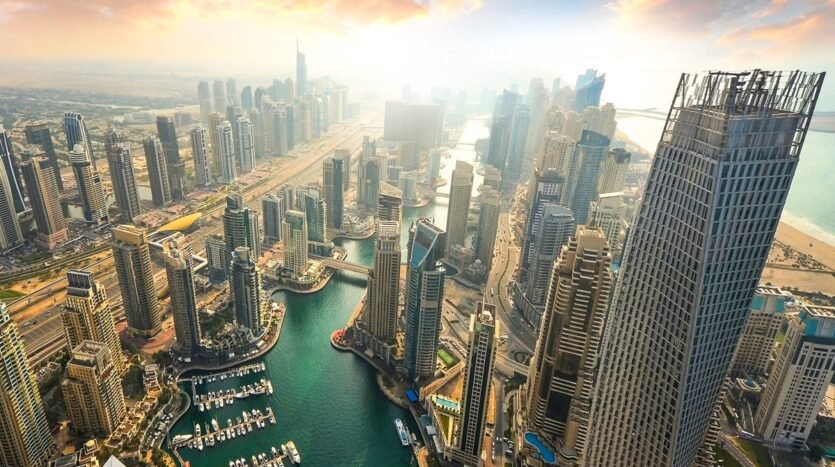The Role of Digitalization in Dubai’s Real Estate Boom: How Technology is Reshaping the Market
Dubai’s real estate market has long been a beacon for international investors, but in 2024, a key driver of this boom is the rapid adoption of digitalization. Technology is transforming how real estate transactions are conducted, making it easier for foreign buyers, particularly Russian investors, to access the market. Faced with skyrocketing mortgage rates at home, Russian investors are flocking to Dubai, attracted by its digitized property sector, seamless transactions, and secure investment environment. Here’s how digitalization is reshaping Dubai’s real estate market and attracting a wave of overseas buyers.
1. The Digital Transformation of Dubai’s Real Estate Sector
The digitalization of Dubai’s real estate sector has revolutionized how properties are bought, sold, and managed. From virtual property tours to blockchain-based transactions, technology is making the market more accessible and efficient for both local and international investors. Digital tools are now integral to every stage of the real estate process, allowing buyers to complete transactions remotely, which is particularly appealing for foreign investors who may not always be physically present in Dubai.
In addition, proptech solutions, such as AI-driven analytics and big data, provide valuable insights into market trends, helping investors make informed decisions. This has led to a more transparent and efficient market where investors can track property values, legal regulations, and market conditions in real time, enhancing investor confidence (D&B Dubai).
2. Attracting Russian Investors Amid High Mortgage Rates
With mortgage rates in Russia soaring, reaching up to 18%, many Russian buyers are turning to Dubai’s real estate market as a safer, more cost-effective alternative. Dubai’s investor-friendly policies, coupled with its rapidly digitized market, provide Russian investors with an opportunity to invest in high-value properties with fewer financial barriers. The availability of virtual property viewing, online transaction platforms, and automated documentation processes makes it easier for Russian investors to navigate the Dubai market without having to travel extensively.
The ease of access provided by digitalization has led to a significant surge in off-plan property sales, particularly in luxury developments. Russian investors are capitalizing on flexible payment plans, low tax rates, and the promise of capital appreciation in Dubai’s booming market. Digital platforms have made it easier for them to monitor investment progress and manage property transactions remotely, allowing for smoother investment processes (Azco Real Estate).
3. Blockchain and Secure Real Estate Transactions
One of the most transformative aspects of digitalization in Dubai’s real estate sector is the integration of blockchain technology. Blockchain offers unparalleled security and transparency, ensuring that property transactions are tamper-proof and fully traceable. For foreign investors, particularly those coming from regions with economic instability, blockchain provides a level of trust and confidence that is crucial when making large-scale investments.
Russian investors, in particular, are benefiting from blockchain’s ability to secure cross-border transactions and reduce the risks associated with traditional property dealings. The Dubai Land Department (DLD) has implemented blockchain technology to streamline property transactions, reduce processing time, and eliminate fraud. This has been a key factor in attracting overseas buyers, as it ensures that their investments are protected by cutting-edge technology (Khaleej Times).
4. Virtual Reality and Artificial Intelligence in Property Viewing
The introduction of virtual reality (VR) and artificial intelligence (AI) has made property viewing and investment decisions easier than ever before. Virtual reality allows potential buyers to explore properties from anywhere in the world, offering immersive, 360-degree views of real estate projects. Russian investors, many of whom face travel restrictions or logistical challenges, can now make informed decisions without having to visit Dubai in person.
AI-powered platforms provide personalized property recommendations based on an investor’s preferences, budget, and desired locations. These innovations have streamlined the property search process, making it more efficient for investors to find the right opportunities in a competitive market. With AI and VR, Russian investors are able to engage with Dubai’s real estate offerings remotely, accelerating the decision-making process and boosting market activity (Kelt & Co Realty).
5. The Impact on Dubai’s Local Market
The influx of Russian investors into Dubai’s real estate market has had a profound impact on local property dynamics. Demand for luxury villas, off-plan properties, and high-end apartments has surged, particularly in prime areas such as Palm Jumeirah, Downtown Dubai, and Dubai Marina. The combination of attractive pricing, flexible payment options, and cutting-edge technology has positioned Dubai as a top choice for international buyers looking for safe, high-return investments.
Digitalization has played a pivotal role in managing this increased demand, ensuring that the market remains accessible and efficient. Automated systems, digital contracts, and blockchain verification have reduced transaction times and provided more transparency for all parties involved. This has not only increased investor confidence but has also ensured that Dubai’s real estate market continues to thrive despite global economic uncertainties.
Conclusion
Digitalization is transforming Dubai’s real estate market, reshaping how properties are bought, sold, and managed. For Russian investors facing high mortgage rates at home, Dubai’s digitized property sector offers an attractive alternative, with seamless transactions, secure blockchain systems, and innovative tools like virtual reality and AI. As the market continues to evolve, digitalization will remain a key driver of Dubai’s real estate boom, attracting more international investors and ensuring long-term growth in the local property sector.



